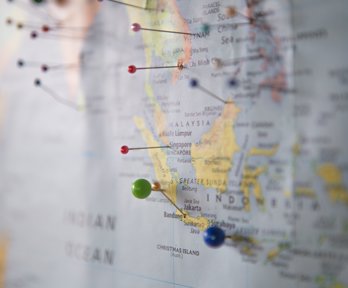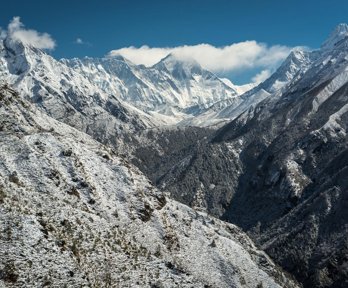
Fund an expedition
Fundraising can be one of the most challenging elements to planning your expedition. We have a number of resources to help you secure the finances to make your field project a success.
Funding an expedition: getting started
Here are three steps to help you calculate how much money you will need, where the money might come from, and what information you need to prepare to ask for funding.
1. Create a budget
Start by considering:
-
How much money do you need?
-
Can you pay for it yourselves?
-
Ways to reduce costs without jeopardising the objectives or safety
- How might you raise the (extra) money needed and from who?
2. Sources of funding
Financial support for your venture in either cash or kind is likely to come from:
-
Grant-giving organisations
-
Charitable trusts
-
Expedition members personal contributions
-
Commercial sponsorship and media interest
- Crowd fund from the public, friends and family
3. Prepare a proposal
Whatever format(s) you use to describe why your venture deserves funding, you should include:
- Clear description of the project’s aims and objectives
- Relevance and timeliness. Why this project is worth supporting,
- Geographical location and map of study area
- Team member profiles including those from the host country
- Institutional collaborators or support
- Budget Summary with sources of income and expenditure,
and any funds already raised - Contact details for follow-up enquiries
Listen to the RGS Explore planning podcast on fund-raising.
Look to see if you are eligible for any RGS grants
Check out the list of other funding organisations
Read the fund-raising chapters in the RGS Expedition Handbook
Watch Craig Pollard's short talk on how to prepare a fundraising pitch
Create a budget
Your budget is the financial representation of your plan and will encourage you to look at the detailed costs of the travel, accommodation, food, and equipment. Identify grants, and possible gifts in kind that will help reduce your costs. Amend the budget as your plans develop.
Items to include in the budget:
-
Maximum and minimum ‘guesstimates’ for all items of expenditure and income
-
Fixed costs that are likely to remain unchanged
-
Adjustable costs that may be variable depending on the scope and scale of the projects.
-
Contingency costs of 10-20% of your total excepted expenditure
Financial management
Appoint a treasurer to monitor income and expenditure, record transactions before, during, and after the project, and produce the final accounts. But remember fund-raising is usually the responsibility of the whole team.
Open a bank account, preferably one that has branches in your host country.
Why should anyone give you money?
Before appealing for financial support, you will need to be clear about why they might give and tailor your approach accordingly. Reasons might include:
-
Research: the acquisition of new knowledge and the training of field scientists
-
Personal development: to learn from the experience of planning a project, travelling, and working with others
-
Publicity/brand endorsement of a business or product
>>> Watch Craig Pollard's short talk on how to prepare for fundraising and pitch your ask:
Grant-giving organisations
The Society's Grants Programme supports geographical research and scientific expeditions each year in the UK and overseas. You can also browse a list of other grant-giving organisations.
Charitable trusts
There are hundreds of charitable trust funds in the UK and some of them support such activities as environmental conservation and medical research or international development, which may be relevant to your expedition. A few are concerned with specific geographical regions.
Names of the trusts can be found in the a number of directories, including the Directory of Grant-Making Trusts, which are held in most public and university libraries.
Read past expedition reports to see which trusts have funded similar expeditions.
Read NCVO’s guide How to write an application to a charitable trust
From expedition members (personal contributions)
Most organisations will want to see that expedition members are making their own financial contributions to the venture. Fix them as high as possible to cover at least 50% of the expected expenditure, if possible. Some expeditions are funded entirely this way.
Personal contributions should ideally cover: a substantial portion of the airfare, a joining fee towards general expedition overheads, and a daily rate to cover food and subsistence for each day in the field.
Get these personal contributions into the expedition bank account as soon as possible or consider asking members to set up a monthly standing order. If you are successful in your fundraising from other sources, these contributions can be reduced by refunding money later.
From the public
Crowdfunding is one way that individuals, charities and businesses (including start-ups) can raise money from the public to support a project, campaign or person, usually using a web-based donation platform such as JustGiving. This type of fundraising is a regulated activity under the Financial Services and Markets Act 2000.
Expeditions tend to use two forms of crowdfunding:
-
donation-based crowdfunding: supporters give money to enterprises or organisations they want to support
-
pre-payment or rewards-based crowdfunding: supporters give money in return for a reward, service or product (such as a free lecture, expedition merchandise, or postcard from the field)
Be aware most platforms will charge fees based on each transaction.
>>> Listen to Tom Allen’s experience of crowdfunding as told at the 2019 RGS Explore weekend.
Fundraising events and activities can be particularly successful for those who have a large volunteer workforce with time on their hands. Some methods have legal restrictions, and some can cost more to run than you expect, but the opportunities before, during and after the expedition are many. Examples include: sponsored events, raffles, selling merchandise, themed evenings etc.
Commercial sponsorship and media interest
Sponsorship and publicity are viewed by some as essential components of a successful expedition. Nothing could be further from the truth. Much time and effort, that could otherwise be spent preparing for the venture or earning the money to pay for it, will need to be invested if an expedition is to attract any form of sponsorship or publicity.
That said, sponsorship does exist for the expedition team that has the tenacity, drive and determination to find it.
Read Paul Deegan’s advice on commercial sponsorship and the media

Other funding sources

Budgeting and fundraising

Charity fundraising expeditions

Proposed budget

Commercial sponsorship and the media

Possible headings to include in an expedition brochure

A sample press release
An example of a press release issued to a number of publications before the start of the expedition.